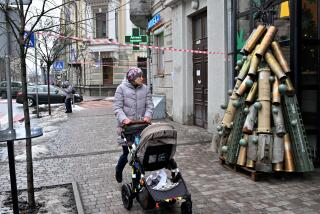Nelson Mandela’s 93rd birthday inspires South Africa
- Share via
Reporting from Alexandra, South Africa — A highway and a mile-wide valley divide the glittering retail towers and leafy suburbs of Sandton from the exuberant chaos and squalid poverty of Alexandra township in South Africa. But on Mandela Day, the birthday of the nation’s best-loved liberation hero, the gulf seems less impossible.
Nelson Mandela celebrated his 93rd birthday Monday with family at his home village of Qunu in the Eastern Cape, while adoring compatriots rolled up their sleeves and did some good.
It’s a day when people in South Africa try a little kindness — 67 minutes’ worth — in honor of the 67 years that Mandela worked for equality in the African nation, from 1942 until his retirement from public life in 2009.
Even on South Africa’s most optimistic day, the differences are stark. In Sandton, bling-adorned shoppers wheel shopping carts laden with consumer luxuries. In Alexandra, a shabby father pushes his two toddlers in one. Goods are laid out on the township’s sidewalk or sold from the back of trucks, and women fry dough in pots over open fires. Torn posters tout $200 loans and abortions.
On this Mandela Day, South Africa’s bitter winter season of chill winds and wildcat strikes seemed to recede. The sun shone.
At Itlhokomeleng Old Age Home in Alexandra, a peek into a tiny purple room revealed two small beds with love-worn teddy bears on the pillows. Residents sat in wheelchairs and moth-eaten couches in a small yard behind the communal dining room.
Laid out before them for Mandela Day was a feast of cupcakes, pies, chicken legs, sausages and sandwiches, like a Thanksgiving table.
In one of many similar events across the country, a group of retailers, a radio station and the government electricity supplier delivered a large pile of donated food, blankets and gift bags to the home and changed all the light bulbs for low-energy versions.
“There’s Sandton, and here’s Alexandra, right on the doorstep. If we can bring the two together, as we have tried to do today, then we’ll have achieved something,” said Dennis O’Donnell, station director of event sponsor SAFM radio, which ran a national campaign for donated food.
“One lady phoned in and said that of her own initiative she was visiting children’s [nurseries] in underprivileged areas and bringing them cakes or snacks,” he said. “It’s that kind of thing: acts of kindness. I think it’s hugely important because it’s part of the catharsis. There’s a lot of healing that needs to take place in this country, and those acts of kindness will eventually break down the barriers and mistrust between the races in this country.”
One Mandela Day celebrant’s contribution was to tweet inspiring Mandela quotes all day. Another made sandwiches, another did finger painting with children, and yet another took children ice-skating.
Mandela’s increasingly frail health in recent months has alarmed a nation that is obsessed with his heroic contribution. Rumors have swirled of the former president’s death, or near demise. When he caught a cold this year, members of the media camped by the hundreds outside his hospital and home for weeks.
Underlying Monday’s celebrations was a fear Mandela might not be here the next Mandela Day.
Just after 8 a.m., millions of schoolchildren sang a happy birthday song to “Tata,” or Grandpa: “We love you, Tata. We love you, Tata. We love you, dear Tata. Happy birthday to you.”
Although Mandela has often asked that his saintly status be toned down, the cult of personality created by a committee of African National Congress leaders during the early years of his imprisonment on Robben Island in the 1960s and ‘70s gained its own unstoppable momentum long ago. So get-the-T-shirt merchandising was a major part of Mandela Day.
Government departments, major companies and media outlets ran events across the country, including pothole-fixing operations and donations of books to schools. South African Airways, the poorly performing state-owned airline, branded its fleet with the Mandela Day logo and flew a group of underprivileged children from around the country to Johannesburg to give them their first plane ride.
Mandela Day began in 2009, and the South African government and United Nations have been pushing to make it an international event, encouraging people in every country to give 67 minutes to a humanitarian cause — or just to do a good deed.
South African diplomats in Washington served food at a homeless shelter, while members of the mission at the U.N. headquarters in New York painted benches in Central Park. In Kenya they raised money for a children’s home, in Japan they visited blind people, and in Thailand they planted trees.
At the Itlhokomeleng home, 72-year-old resident Adam Nonyane, paralyzed in a traffic accident and unable to live at home, said Mandela Day was a sad event because it reminded him of the suffering Mandela endured during his 27 years of imprisonment under apartheid.
But for others at the home it was joyful. One resident rocked and clapped his hands enthusiastically when a choir from Johannesburg belted out harmonies dedicated to the former president.
Zodwa Khumalo, who uses a wheelchair, sat at the back in the sun, her body swaying to the songs, her arms waving, a look of ethereal joy sweeping her.
“It’s beautiful, that was beautiful,” she said, a huge smile on her face. “I love Mandela Day! I can’t forget that man. Mandela, he says South Africa has one flag, and the people, black and white, now their blood is one.
“I feel proud! Proud!”
More to Read
Sign up for Essential California
The most important California stories and recommendations in your inbox every morning.
You may occasionally receive promotional content from the Los Angeles Times.










